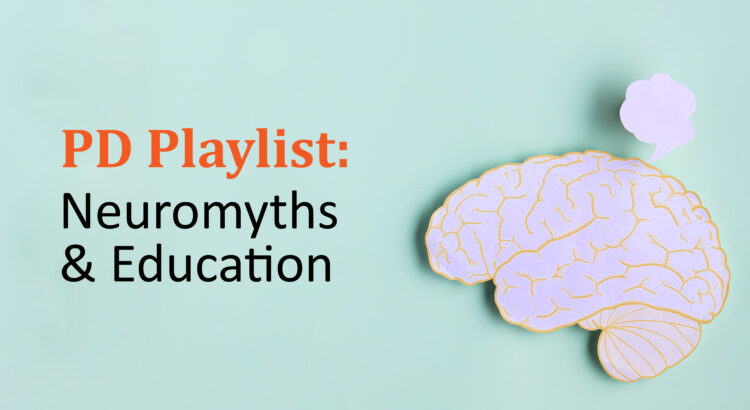Misconceptions about the brain, or neuromyths, have been popular among instructors and students for a few decades now. The reasons vary from misinterpretation or miscommunication to the lack of access to Neuroscientific research. You probably heard about ‘learning styles’, one of the most pervasive neuromyths in Education. Holding these myths true can have detrimental effects for students learning if we develop curriculum, design teaching and learning activities and assessments, and coach students about their learning with these unscientific facts in mind.
To help anyone learn more about Neuromyths and Education, TCDC has compiled another “PD Playlist.” We’ve arranged the resources from “sound bite” to “radio play” to “extended dance mix” and “full LP.” Some options will take just a few minutes of your time while others will require a longer commitment.
Visit the TCDC site, to view the entire catalogue of PD Playlists.
March PD Playlist
Sound Bites <10 minutes
Learning Styles as a Myth (article | 00:05:00)
Grounded on great references, this article by the Poorvu Center for Teaching and Learning at Yale dispels the myth of learning styles and recommends scientifically sound strategies that actually promote student learning.
Radio Play<20 minutes
Brain Myths: 10 Neuromyths Set Straight (article | 00:11:00)
Educational Specialist Susan du Plessis compiles some of the common brain myths or neuromyths, many relating to learning and education.
Extended Dance Mix <60 minutes
Neuroscience and Education: Myth and Messages (article| 00:25:00)
Dr Paul Howard-Jones, University of Bristol, delves into how gaps between neuroscience and education contributed to the emergence of distortions of scientific facts about the brain and how they relate to teaching and learning.
The Science in the Art of Teaching (webinar | 00:41:00)
Tracey Tokuhama-Espinosa, Hardvard professor and author, clarifies key terminology, describes common neuromyths, contemplates the belief in neuromyths as a reflection of one’s values and attitudes, and explains why educators should actively help debunk these myths.
Full LP >1 hour
Neuromyths: Debunking False Ideas about the Brain (book | 04:00:00)
Hardvard professor Dr Tracey Tokuhama-Espinosa untangles scientific fact from pedagogical fiction, debunking dozens of widely held beliefs about the brain that have made their way into the education literature.
Neuro, Cognitive and Learning Sciences, Part 1: Bringing Theory (online course| 08:00:00)
This is an asynchronous, week-long workshop that will begin on a Monday and end on the following Sunday. The workshop will require approximately 6-8 hours of work, including reading research-based articles, viewing presentations, engaging in online discussion forums, and more. See also Neuro, Cognitive and Learning Sciences, Part 2: Applying Theory to Practice.

